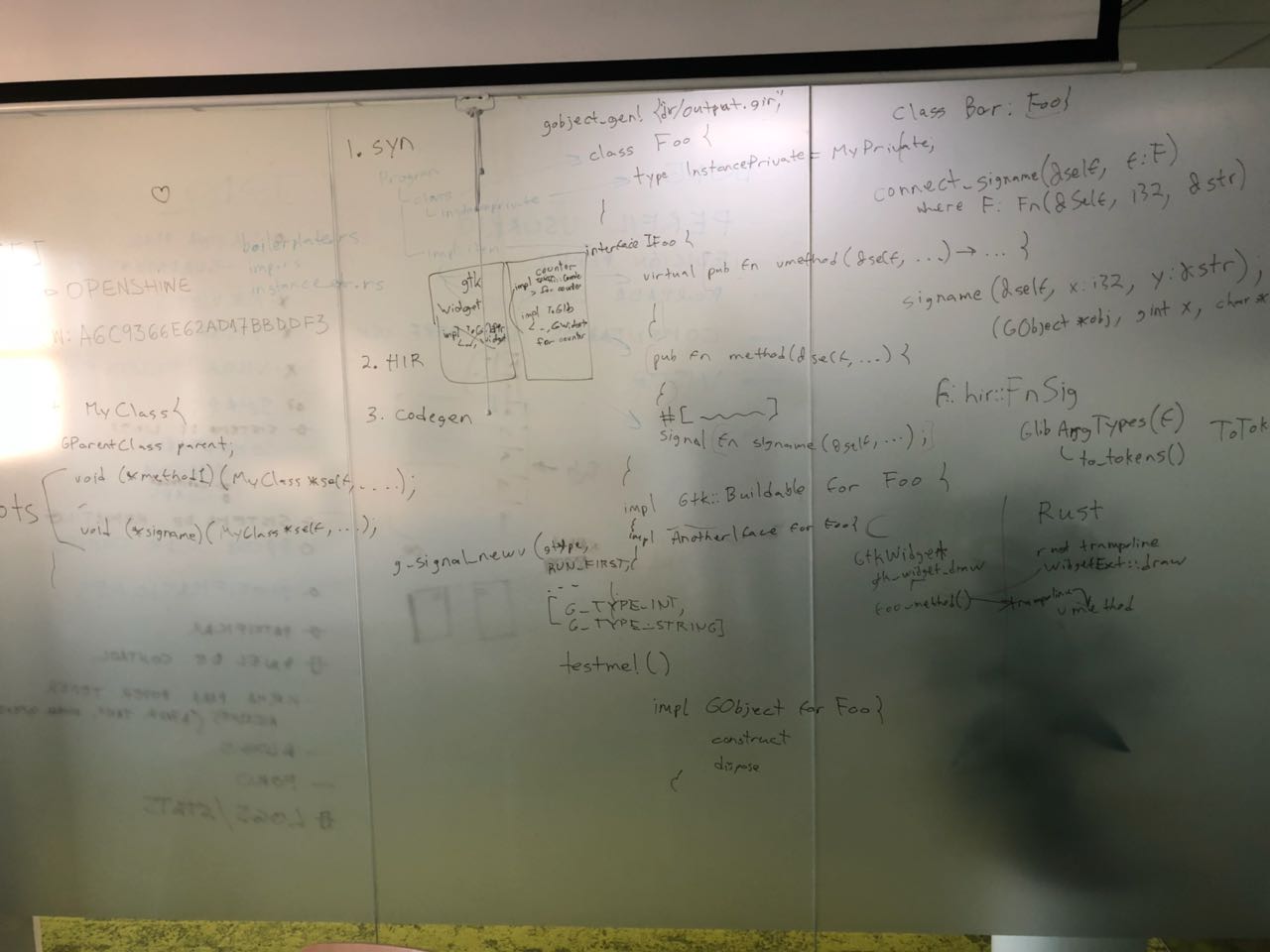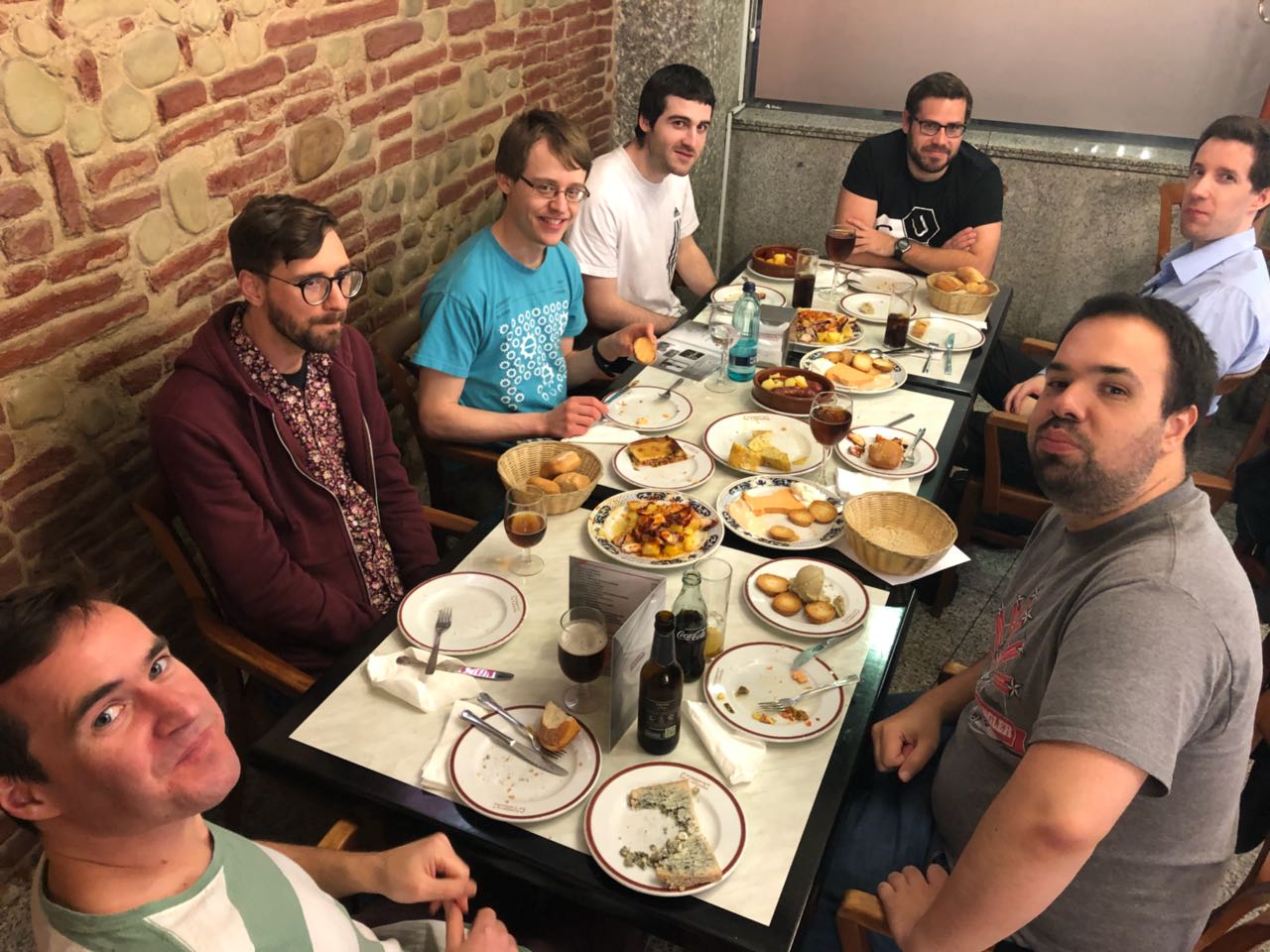The last week was the GNOME 💙 Rust hackfest in Madrid. I was there, only for the first two days, but was a great experience to meet the people working with Rust in GNOME a great community with a lot of talented people.
The event was in the OpenShine office, that was a great place and the OpenShine people was very friendly too so thank you very much to OpenShine for support this kind of events.
What I did during the Hackfest
I arrive at 10:30, more or less, and there are some people there, but two or three comes after the lunch, so the first morning we started to work, each one in their project.
I've some patches for Fractal to review and I was working on the glade file splitting. After that I downloaded the gnome-class code and started to read and try to understand the code because I want to help in the gnome-class development during the Hackfest.
After the lunch, the missing people from the morning was there so we did an official "Hackfest presentation" everyone did a little presentation about his work and what want to do during the event.
Gnome-class was the main project to join GNOME and Rust, and it's still in a early alpha stage so Federico give us a little talk about what's gnome-class and its parts.
Gnome-class
Gnome-class is basically a compiler that translate custom syntax to Gobject binary compatible Rust code. Using the proc-macro, gnome-class parses a Gobject like declaration and creates all the Rust code needed to use the Glib so we can have binary code that can be called from C or from Rust. With this we can do Object Oriented programming in Rust using the Gobject library and types.
So we've three parts in gnome-class, the parser, the High-level Internal Representation (HIR) and the code generation.
gobject_gen! {
class Counter {
f: Cell<u32>,
}
impl Counter {
pub fn add(&self, x: u32) -> u32 {
self.get_priv().f.set(self.get() + x);
self.get()
}
pub fn get(&self) -> u32 {
self.get_priv().f.get()
}
}
}
#[test]
fn test() {
let c: Counter = Counter::new();
println!("Counter has value: {}", c.get());
c.add(2);
c.add(20);
assert_eq!(c.get(), 22);
println!("Counter has value: {}", c.get());
}
This is Rust code with gnome-class, here we're creating a new Class
called Counter with two public methods, then we've a test that use this.
Behind this code, gnome-class generates a lot of ugly code with pointers
and so to make all of this C-Compatible and generate all the needed binary
using the GObject data scheme.
My work in gnome-class
Properties declaration was not supported in gnome-class so took that task. There was a proposed syntax and I started to work in the parser to try to support that syntax and convert all the relevant information into a Rust struct in the HIR tree.
To parse that I needed to learn syn that's a parser based in nom. That was not easy, but there's a lot of code in gnome-class so I can read and learn from that and at the end of the day I had a working properties parser.
The second day I continue with my work and started to generate code. Here I have more problems because the code generated is too low level and I didn't now much about the GObject internals so I was playing around types conversions.
I've to go just after the lunch, but during the back to home train trip I was able to create a Merge Request with all the work I've done.
I've work to do during the week so I can't continue working on properties support in gnome-class. But this week I've more time and I've been working to complete the code generation, so now we've this test working:
#![feature(proc_macro)]
extern crate gobject_gen;
#[macro_use]
extern crate glib;
use gobject_gen::gobject_gen;
use std::cell::Cell;
gobject_gen! {
class ClassWithProps {
p: Cell<u32>,
p2: Cell<u32>,
}
impl ClassWithProps {
pub fn get(&self) -> u32 {
self.get_priv().p.get() +
self.get_priv().p2.get()
}
property MyProp: T where T: u32 {
get(&self) -> T {
let private = self.get_priv();
return private.p.get();
}
set(&self, value: T) {
let mut private = self.get_priv();
private.p.set(value);
}
}
property Prop2: T where T: u32 {
get(&self) -> T {
let private = self.get_priv();
return private.p2.get();
}
set(&self, value: T) {
let mut private = self.get_priv();
private.p2.set(value);
}
}
}
}
#[test]
fn test_props() {
let obj: ClassWithProps = ClassWithProps::new();
assert_eq!(obj.get(), 0);
assert_eq!(obj.get_property_prop2(), 0);
obj.set_property_prop2(42);
assert_eq!(obj.get(), 42);
assert_eq!(obj.get_property_prop2(), 42);
obj.set_property_myprop(58);
assert_eq!(obj.get_property_myprop(), 58);
}
My first GNOME hackfest
This was my first GNOME hackfest. I've been in different GUADECs and other events with GNOME devs, but this was the first time that I travel to work on a specific project and not just to meet the people and view talks from the distance.
It was a great experience. Rust is really new in the desktop development, but there's a lot of people working so it's great.
The next milestone is the Fractal Hackfest, we'll be in Strasbourg four days working.
I want to thank all the great GNOME community that makes collaboration so easy, it's a great community.
Currently all of my work on this is voluntary so I need to thank my coworkers at Wadobo, because I'm spending some work time in this. I can do this because my company is great.




Comments !